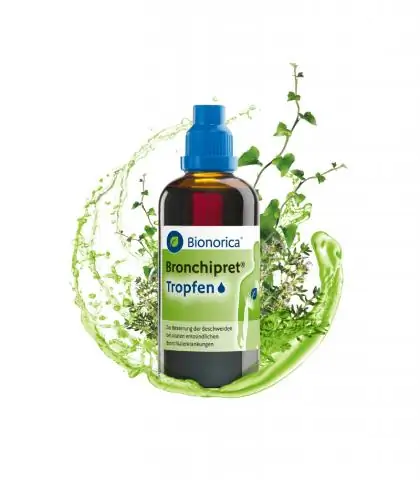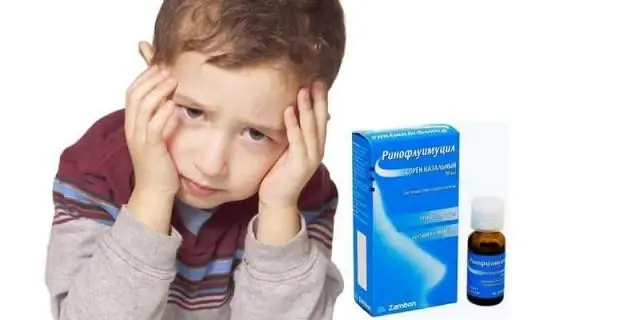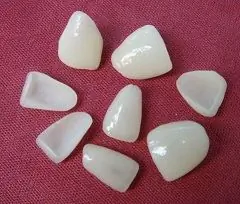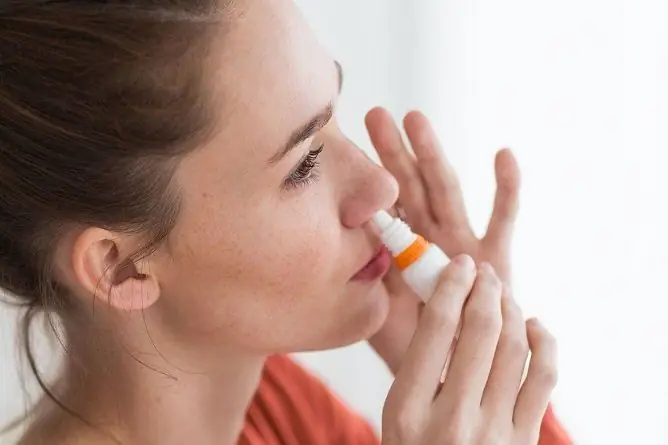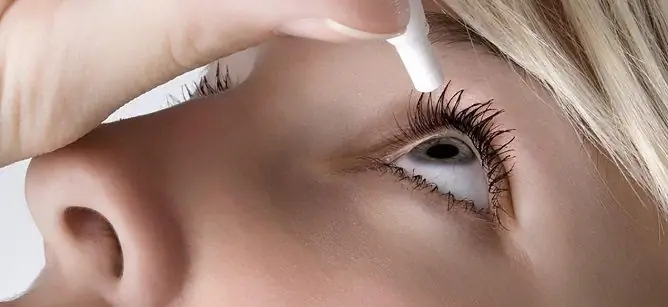Rhinorus
Rinorus: instructions for use and reviews
- 1. Release form and composition
- 2. Pharmacological properties
- 3. Indications for use
- 4. Contraindications
- 5. Method of application and dosage
- 6. Side effects
- 7. Overdose
- 8. Special instructions
- 9. Application during pregnancy and lactation
- 10. Use in childhood
- 11. Drug interactions
- 12. Analogs
- 13. Terms and conditions of storage
- 14. Terms of dispensing from pharmacies
- 15. Reviews
- 16. Price in pharmacies
Latin name: Rinorus
ATX code: R01AA07
Active ingredient: xylometazoline (xylometazoline)
Manufacturer: Sintez JSC (Russia)
Description and photo update: 2018-23-10
Prices in pharmacies: from 18 rubles.
Buy

Rhinorus is a local vasoconstrictor drug used in ENT practice.
Release form and composition
Dosage forms of Rhinorus:
- nasal drops: colorless or with a slightly yellowish tinge, transparent, with the smell of eucalyptus (in polymer dropper bottles of 5 or 10 ml, 1 dropper bottle in a cardboard box);
- nasal spray: colorless or with a slightly yellowish tinge, transparent, with the smell of eucalyptus (10 or 20 ml each in plastic bottles with a spray nozzle and a cap-cap, in a cardboard box 1 bottle);
- nasal gel: colorless or with a slightly yellowish tinge, transparent (5, 10 or 15 g in aluminum tubes, in a cardboard box 1 tube).
Composition of 1 ml drops and spray Rinorus:
- active substance: xylometazoline hydrochloride - 0.5 or 1 mg;
- auxiliary components: benzalkonium chloride - 0.1 mg; sodium chloride - 5 mg; edetate disodium - 0.5 mg; sodium dihydrogen phosphate dihydrate - 6 mg; sodium hydrogen phosphate dodecahydrate - 3.5 mg; eucalyptus oil - 0.85 mg; water for injection - up to 1 ml.
Composition of 1000 mg Rinorus gel:
- active substance: xylometazoline hydrochloride - 0.5 or 1 ml;
- auxiliary components: sodium chloride - 5 mg; hyetellose - 20 mg; benzalkonium chloride - 0.1 mg; disodium edetate dihydrate - 0.5 mg; disodium phosphate dodecahydrate - 3.5 mg; sodium dihydrogen phosphate dihydrate - 6 mg; sorbitol - 20 mg; glycerol - 40 mg; purified water - up to 1000 mg.
Pharmacological properties
Pharmacodynamics
Rhinorus is one of the vasoconstrictor drugs for local use in ENT practice.
The active substance is xylometazoline, an alpha-adrenergic agonist, which causes narrowing of the blood vessels of the nasal mucosa, which helps to eliminate its edema and hyperemia, restore the patency of the nasal passages, facilitate nasal breathing and improve the discharge of nasal discharge with rhinitis (runny nose) of various etiologies.
The action of the drug develops in a few minutes after application, its duration is up to 10 hours.
Pharmacokinetics
Rhinorus is practically not absorbed, and therefore its plasma concentration in the blood is very low.
Indications for use
- acute rhinitis, including developed against the background of acute respiratory diseases and allergic rhinitis;
- otitis media (as part of a combination treatment to reduce swelling of the nasopharyngeal mucosa);
- eustachitis;
- sinusitis;
- conditions in preparation for diagnostic manipulations in the nasal passages;
- rhinoscopy (to facilitate its conduct).
Contraindications
Drops, spray
Absolute:
- severe atherosclerosis;
- arterial hypertension;
- atrophic rhinitis;
- tachycardia;
- hyperthyroidism;
- glaucoma;
- burdened history of surgical interventions on the meninges;
- combination therapy with tricyclic antidepressants and monoamine oxidase inhibitors, as well as with other drugs that increase blood pressure;
- age up to 2 years (for spray and drops of Rinorus of any concentration); up to 6 years (for spray and drops of 0.1%);
- pregnancy (drops);
- individual intolerance to the components of the drug, including eucalyptus oil.
Relative (Rhinorus is prescribed under medical supervision):
- diabetes;
- cardiac ischemia;
- angina pectoris III – IV functional class;
- hyperplasia of the prostate;
- pregnancy (spray);
- lactation period.
Gel
Absolute:
- burdened history of surgical interventions on the meninges;
- atrophic rhinitis;
- tachycardia;
- combination therapy with tricyclic antidepressants and monoamine oxidase inhibitors, as well as with other drugs that increase blood pressure;
- glaucoma;
- severe atherosclerosis;
- arterial hypertension;
- thyrotoxicosis;
- condition after transsphenoidal hypophysectomy;
- age up to 3 (for gel 0.05%) or 12 years (for gel 0.1%);
- pregnancy;
- individual intolerance to the components of the drug.
Relative (Rhinorus is prescribed under medical supervision):
- diabetes;
- angina pectoris;
- hyperplasia of the prostate;
- hyperthyroidism;
- porphyria;
- pheochromocytoma;
- hypersensitivity to adrenergic drugs, which is accompanied by symptoms such as increased blood pressure, insomnia, dizziness, tremor, arrhythmia;
- lactation period.
Instructions for the use of Rhinorus: method and dosage
Drops
Recommended dosing regimen (in each nasal passage):
- children from 6 years old and adults (0.1%): 3-4 times a day, 2-3 drops;
- children 2-6 years old (0.05%): 1-2 times a day (maximum - 3 times a day), 1-2 drops.
The duration of continuous use is from 3 to 5 days.
Rhinorus drops are instilled into the nose by lightly pressing the bottom of the bottle.
Spray
The spray bottle should be kept upright if possible. Before the first use, it is necessary to press the spray nozzle several times (a spray with a "cloud of fog" should appear). The drug should be inhaled through the nose.
The recommended dosage regimen of Rinorus spray (in each nasal passage):
- children from 6 years old and adults (0.1%): 3 times a day, 1 injection (maximum - 2 injections);
- children 2–6 years old (0.05%): 1–2 times a day (maximum 3 times a day), 1 injection.
The duration of continuous use is from 5 to 7 days.
Before the repeated course, a break of several days is required.
Gel
A single dose - 100 mg (a pea with a diameter of 1 cm), contains 0.05 or 0.1 mg of xylometazoline hydrochloride (0.05% / 0.1%).
The recommended dosing regimen (in each nasal passage): every 8-10 hours, 1 dose (children 3-12 years old - 0.05% gel, children from 12 years old and adults - 0.1% gel).
The duration of continuous use is from 3 to 5 days.
Side effects
Frequency of adverse reactions:> 10% - very often; > 1% and 0.1% and 0.01% and <0.1% - rarely; <0.01%, including isolated messages - very rare.
Drops, spray
- systemic reactions: blurred vision, vomiting, palpitations, headache, increased blood pressure, insomnia; when conducting a long course with high doses - depression;
- local reactions: with prolonged / frequent use - hypersecretion, sneezing, dryness / irritation of the nasopharyngeal mucosa, paresthesia, burning; rarely - swelling of the nasal mucosa.
Gel
- systemic reactions: infrequently - allergic reactions (in the form of suffocation, angioedema, skin rash, urticaria); rarely - visual impairment, vomiting, tachycardia, palpitations, increased blood pressure (especially in the presence of diseases of the circulatory system); very rarely - headache, nausea, weakness, drowsiness, fatigue, arrhythmia, convulsions (mainly in children), paresthesia, anxiety, hallucinations (mainly in children); when conducting a long course with high doses - depression;
- local reactions: often - irritation / dryness of the nasal mucosa, burning sensation in the nose and throat, hypersecretion, sneezing; infrequently - nosebleeds, reactive hyperemia; with a long course / use of exceeding the recommended doses - rhinitis medicamentosa.
Overdose
Drops, spray
The main symptoms: bradycardia, a decrease in body temperature, an increase in blood pressure.
Conducting symptomatic therapy is shown.
Gel
The main symptoms: respiratory depression, increased sweating, dizziness, a sharp drop in body temperature, headache, bradycardia, tachycardia, arrhythmia, increased blood pressure (then a sharp drop is possible), convulsions and coma; in young children - dominant central effects with convulsions, bradycardia and coma, apnea, as well as increased blood pressure after hypotension; in children, excessive sedation.
Conducting symptomatic therapy is shown. The patient's condition must be monitored for several hours. In severe poisoning with cardiac arrest, resuscitation should be performed for at least 1 hour.
special instructions
During therapy, it is necessary to adhere to the dosage regimen indicated in the instructions, in particular this applies to children and elderly patients.
The nasal passages must be cleaned before using Rhinorus.
The preparation contains benzalkonium chloride, which can irritate the nasal mucosa.
Influence on the ability to drive vehicles and complex mechanisms
According to the instructions, Rinorus, when used in therapeutic doses for a short course, does not affect the ability to drive vehicles. When used in high doses / long-term use, disorders of the central nervous system and circulatory system may develop, and therefore patients should exercise caution while driving.
Application during pregnancy and lactation
- pregnancy - therapy is contraindicated (drops, gel) / requires caution (spray);
- lactation period - the drug can be administered with caution.
Pediatric use
Rinorus is not assigned to children:
- up to 2 years: all forms of the drug in any concentration;
- up to 3 years: drops 0.1%, spray 0.1%, gel 0.05% and 0.1%;
- up to 6 years: drops 0.1%, spray 0.1%, gel 0.1%;
- up to 12 years: gel 0.1%.
Drug interactions
With the combined use of Rhinorus with monoamine oxidase inhibitors and tricyclic antidepressants, the systemic action of xylometazoline may increase, and therefore such a combination should not be used.
Given the potentiation of actions, it is necessary to avoid the simultaneous use of xylometazoline with other adrenomimetic agents (in particular, pseudoephedrine, ephedrine).
Analogs
Analogs of Rhinorus are: Grippostad Rino, Doctor Theiss Rinotaiss, Zvezdochka NOZ, Galazolin, Dlyanos, Xilen, Rinostop, Otrivin, Xymelin, Nosolin-balm, Influrin, Xylometazolin, Espazolin, Tizin, Xylometazolin, Sanorin.
Terms and conditions of storage
Store in a place protected from light and moisture at temperatures up to 25 ° C. Keep out of the reach of children.
Shelf life:
- spray, gel - 2 years;
- drops - 3 years.
Terms of dispensing from pharmacies
Available without a prescription.
Reviews about Rhinorus
According to reviews, Rinorus is a safe, affordable and effective drug. They indicate a soft and quick action of the agent: it clears the sinuses, makes breathing easier, relieves swelling well and does not dry out the nasal mucosa much. It is also noted that the drops are packaged in a convenient soft bottle with a dispenser.
The price of Rinorus in pharmacies
The approximate price for Rinorus is:
- spray 0.05% or 0.1% (1 bottle per package): 55-60 or 57-82 rubles;
- drops 0.05% or 0.1% (1 bottle-dropper in the package): 18 or 22-26 rubles.
Rinorus: prices in online pharmacies
|
Drug name Price Pharmacy |
|
Rhinorus 0.05% nasal drops with eucalyptus oil 10 ml 1 pc. RUB 18 Buy |
|
Rinorus gave the drops. 0.1% 10ml RUB 20 Buy |
|
Rhinorus 0.1% nasal drops with eucalyptus oil 10 ml 1 pc. RUB 20 Buy |
|
Rinorus gave the drops. 0.05% 10ml RUB 21 Buy |
|
Rinorus 0.05% nasal spray with eucalyptus oil 10 ml 1 pc. RUB 56 Buy |
|
Rhinorus 0.05% nasal spray 20 ml 1 pc. RUB 65 Buy |
|
Rinorus nasal spray. 0.05% 10ml RUB 69 Buy |
|
Rinorus nasal spray. 0.1% 20ml 73 rbl. Buy |
|
Rhinorus 0.1% nasal spray with eucalyptus oil 20 ml 1 pc. 73 rbl. Buy |
|
Rhinorus 0.1% nasal spray with eucalyptus oil 10 ml 1 pc. 73 rbl. Buy |
|
Rinorus nasal spray. 0.1% 10ml RUB 80 Buy |
|
Rinorus nasal spray. 0.05% 20ml 89 RUB Buy |
| See all offers from pharmacies |

Maria Kulkes Medical journalist About the author
Education: First Moscow State Medical University named after I. M. Sechenov, specialty "General Medicine".
Information about the drug is generalized, provided for informational purposes only and does not replace the official instructions. Self-medication is hazardous to health!



